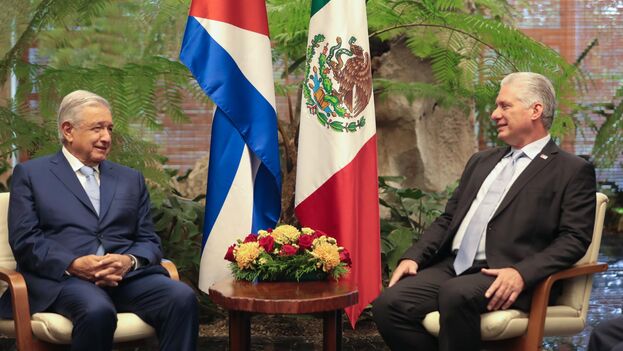
![]() 14ymedio, Olea Gallardo, Havana, 28 December 2022 — Miguel Díaz-Canel’s first public statement on Wednesday was a message to his Mexican counterpart, Andrés Manuel López Obrador. “It was very pleasant to talk on the phone with Brother President López Obrador,” the Cuban president wrote on Twitter, reiterating “the deep gratitude to the people and Government of Mexico for the generous and supportive help provided to Cuba.” Both expressed, he said, “satisfaction with the excellent state of bilateral relations.”
14ymedio, Olea Gallardo, Havana, 28 December 2022 — Miguel Díaz-Canel’s first public statement on Wednesday was a message to his Mexican counterpart, Andrés Manuel López Obrador. “It was very pleasant to talk on the phone with Brother President López Obrador,” the Cuban president wrote on Twitter, reiterating “the deep gratitude to the people and Government of Mexico for the generous and supportive help provided to Cuba.” Both expressed, he said, “satisfaction with the excellent state of bilateral relations.”
Díaz-Canel did not specify what “generous and supportive help” he was referring to, but he did note one fact: despite the historic cordiality between the two countries, bilateral relations have never been so “excellent.”
The latest milestone is the hiring of 119 more Cuban doctors, as announced on Tuesday by the director of the National Social Security Institute of Mexico, Zoé Robledo, at López Obrador’s usual “morning” press conference.
These health workers will arrive in January “to provide their specialized services,” said Robledo, who recalled the 491 additional doctors who are “in 11 states, in very difficult and marginal places, helping to provide coverage every day and at all times in the hospitals where they are prominent.”
At the beginning of December, this newspaper found that one of those areas for which these doctors were promised, the inaccessible and violent Montaña de Guerrero, still does not receive Cubans.
Beyond that, neither of the two countries has made public how much money Mexico has spent on Cuba since López Obrador took office, on December 1, 2018. The Mexican president’s affinity for the Cuban Revolution is evident, in speech and in action.
The honeymoon began on another honeymoon: the one that López Obrador took with his first wife, the late Rocío Beltrán, in Cuba, in 1979, and continued with the import of the Sandino housing construction system — extended on the Island after the triumph of the Revolution — when the current president was a member of the official PRI party and director of the National Indigenous Institute of the state of Tabasco, at the beginning of the 80s.
After his election as president, the man from Tabasco gave free rein to that old love, which, in the midst of the deep crisis in Venezuela, supplier to the Island for the last two decades, was immediately reciprocated.
For example, the first official visit of Miguel Díaz-Canel after being appointed president was to Mexico, in October 2019.
Since then, the closeness has been characterized by controversy and opacity. In April 2020, medical brigades began to be sent in support, according to the Mexican authorities, of the fight against the COVID pandemic. Schools and public opinion questioned them for not being prepared to face the health emergency and for doing little work. It would then become known, thanks to the investigations of the press and the opposition, that their presence in Mexico cost almost eight million dollars. The official Cuban press itself has given the exact number of health-workers sent to Mexico for that contingency between 2020 and 2021: 1,479.
Despite the controversy over these health workers, the Mexican government won further criticism for the lack of transparency about the scholarships for medical residencies abroad, which began in 2020. The final destination would end up being only Cuba, for which Mexico paid the regime one million dollars, as revealed at the time by the Latinus portal.
Another milestone was the presence of Miguel Díaz-Canel on the presidential stand during the celebrations for the independence of Mexico, in September 2021, where he was even allowed to give a speech, something that had never happened in the country’s history with any foreign head of state.
Last May, López Obrador was reciprocated with the José Martí Order, on his official visit to the Island – one of the very few countries to which he has traveled as president. For those days, and during the Havana Book Fair, in which Mexico was the guest of honor, the opening of a branch of the legendary Mexican state publishing house, the Economic Culture Fund, had been announced,. It would end up happening in August, precariously, and again without information about the amount invested.
The list of solidarity of the current Mexican Administration with Cuba includes the sending of staff from Petróleos Mexicanos (Pemex) and the Ministry of National Defense to help put out the gigantic fire, in August, of the Matanzas Supertanker Base, and members of the Federal Electricity Commission after the passage of Hurricane Ian, in September, as well as the purchase of anti-covid vaccines — not yet approved by the World Health Organization — and the import of Cuban gravel for the construction of one of López Obrador’s emblematic projects, the so-called Mayan Train, on the Yucatan peninsula.
The romance, of which neither Mexicans nor Cubans know the total cost, is far from over.
Translated by Regina Anavy
____________
COLLABORATE WITH OUR WORK: The 14ymedio team is committed to practicing serious journalism that reflects Cuba’s reality in all its depth. Thank you for joining us on this long journey. We invite you to continue supporting us by becoming a member of 14ymedio now. Together we can continue transforming journalism in Cuba.
